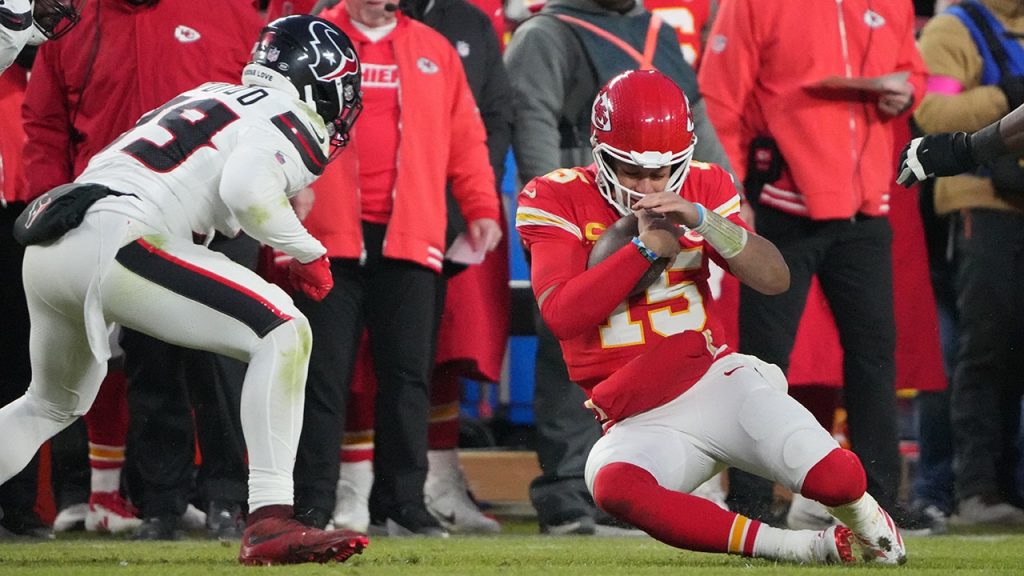The controversial penalties called against the Houston Texans during their playoff loss to the Kansas City Chiefs ignited a firestorm of debate within the NFL community and beyond. Hall of Fame cornerback Champ Bailey, a keen observer of the game, voiced his frustration with the officiating, particularly focusing on two plays involving Chiefs quarterback Patrick Mahomes. These plays, one where Mahomes appeared to flop out of bounds and another where he slid late, drawing an unnecessary roughness penalty, underscored a broader concern about the consistency and accuracy of officiating in crucial moments. Bailey’s critique centered on the seemingly preferential treatment afforded to Mahomes, particularly when operating outside the pocket. He questioned why a quarterback who adopts the role of a runner should receive the same protections as when he’s in the pocket. The perceived inconsistency raised doubts about whether a running back executing the same maneuver would be afforded the same protection. This preferential treatment, real or perceived, fuels the narrative of a rigged game, a perception Bailey acknowledged was gaining traction even among former players like himself.
The incident involving Mahomes sliding late and drawing a penalty against Texans linebacker Henry To’oTo’o became a focal point of Bailey’s criticism. He argued that the play should have been reviewable, allowing officials to assess the situation in slow motion and determine whether the contact was truly egregious. Bailey’s frustration stemmed from the belief that such calls, often made in the heat of the moment, can significantly alter the course of a game. He argued that a more thorough review process would ensure greater accuracy and prevent game-changing calls based on initial impressions that might not reflect the reality of the situation. This, in turn, would bolster the integrity of the game and dispel the growing suspicion among fans that games are manipulated to favor certain teams or players.
Bailey, speaking from his experience as a former player, expressed his growing unease with the perceived discrepancy between how games are officiated and the rules of the game. While acknowledging the difficulty of officiating in real time, he stressed the importance of striving for consistency and accuracy. He advocated for a more robust review process, particularly in situations with game-altering implications, to minimize the impact of incorrect calls. His concern stemmed from the observation that such incidents, occurring repeatedly, erode public trust in the impartiality of the game. The perception of bias, whether warranted or not, ultimately undermines the integrity of the sport and fuels cynicism among fans.
Bailey’s primary concern was not necessarily with the individual calls themselves, but rather with the broader pattern of officiating that seemed to favor quarterbacks, particularly star quarterbacks like Mahomes. He questioned the logic of affording scrambling quarterbacks the same protections as pocket passers, especially when they venture outside the designated area and essentially become ball carriers. This differential treatment, he argued, creates an uneven playing field and raises suspicions about preferential treatment. He emphasized the need for consistent application of rules, regardless of the player’s position or star power. Consistency, he believed, is crucial for maintaining the credibility of the game and ensuring a level playing field for all teams.
The notion of “rigged” games, often dismissed as a conspiracy theory, seemed to be gaining traction, even among seasoned observers of the game like Bailey. He admitted that while he never believed games were fixed during his playing days, the increasing frequency of questionable calls made him more sympathetic to the fan perspective. This growing suspicion, he warned, poses a threat to the integrity and credibility of the NFL. He emphasized the need for the league to address these concerns proactively to maintain public trust. The perceived bias, whether real or imagined, erodes the faith in the fairness of the competition and ultimately diminishes the enjoyment of the game.
Bailey’s comments did not go unnoticed, with Mahomes himself addressing the controversy. The Chiefs quarterback denied receiving preferential treatment, stating that referees strive to call the game fairly. He emphasized his focus on playing the game to the best of his ability and letting the results speak for themselves. However, Bailey’s critique wasn’t directed at Mahomes personally but at the officiating practices that seemed to favor quarterbacks in general. The debate highlighted a larger issue within the NFL regarding the protection of quarterbacks and the consistency of officiating, a conversation likely to continue as the playoffs progress.

